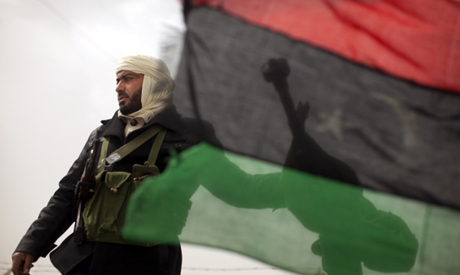
A Libyan rebel who is part of the forces against Libyan leader Muammar Gaddafi stands next to the old flag of Libya before leaving to the front-line near Ras Lanuf, west of the town of Brega, eastern Libya, Friday, 4 March 2011. (AP)
The road to the Libyan border from Cairo, Egypt takes a long 10 hours. But we did it in seven. We cut through 700 kilometres of magnificent desert and sea shores at a hurried pace to get to the Libyan border town, Saloum, to check on the crisis there.
Saloum is an open-air waiting lounge for thousands of immigrants, mainly West Africans and South East Indians. They line up at gates and some lay on floors and pavements covered in rags and blankets waiting for their embassies to take them home. Among them is Addo Manu from Ghana who is having his first meal of the day at 6:30pm — mere bread and jam shared by some Libyan passengers. It is his fourth day at the border. “Immigration officers took our passports and messed them up. They call our names randomly, the embassy asks us to be patient,” sighed Manu.
Although life at the border is difficult, and at times near deadly because of the cold weather, lack of food and medicine — at least it is safer than inside Libya. Manu recalls his last hours in Benghazi where he lived and worked for four “good years”: “I was working until the very last minute. I didn’t get my pay and when the riots came I had no time to get my money or belongings and had to run for my life,” he said. Manu was rescued by his landlord who took him to the seaside.
Manu’s biggest fear these four days as he’s been waiting at the border is the cold: “I have one blanket, sometimes I lay on it and sometimes I cover myself with it. We get food in a very humiliating way. Either Egyptians throw food and we pick it up from the ground or some passengers have food and we beg for some,” said Manu.
Manu is one of around 10,000 Africans stuck at the border, according to an Egyptian officer at the border who preferred to remain anonymous. “Some of them have lost their passports and their embassies are taking a long time to finish the procedures and take them home. Today, the UNHCR (UN High Commission for Refugees) has arrived to help and things are much better,” said the police officer.
Ever since the Libyan leader Colonel Muammar Gaddafi said on TV that that he sealed a deal with African mercenaries to fight the rebels it has been particularly unsafe for Africans. “Unless you take a taxi it is very difficult to walk in the street. You are very likely to get killed,” said Tsante Jonny, 41, whose wife and two children are waiting for him in Ghana. He can’t wait to get home but doesn’t believe it will happen anytime soon.
“Our leaders don’t care. They say tomorrow or the day after we will take you home, but we see nothing,” said Jonny, who, in spite of everything, supports the revolution. “Every nation should have democracy and freedom. I expect that things will improve; people will change and the pan-African nations will be back,” said Jonny.
Across the street from Jonny, Um Heba, a street seller from Saloum dressed in black traditional garb, offers different kinds of local and exported cigarettes. She complains of a lack of work and money, but also declares her support for the revolutions in Egypt, Tunisia and Libya.
“I cook at home and bring food and cigarettes to the people here. I sell a hot meal for LE10 ($1.70) and cigarettes for LE12 ($2). But the conditions here are so difficult. Sometimes I give food for free for those who can’t afford it. Many people lost their jobs and all their savings and just fled to the border. I saw a lot of injuries, and dead bodies; a lot of injustice, but the army and UNHCR are working hard to evacuate people since yesterday and things are looking better today,” added Um Heba.
Just a few steps away, on the Libyan side of the border and at the gate of Tobrok city, the ambiance is completely different. Civilians dressed in army clothes brandish guns and search cars while chanting pro-revolution slogans. The success and euphoria of the revolution is in the air. The young Libyan rebels all carry the pre-Gaddafi Libyan flag. All the walls are covered with pro-revolution slogans like “Long live Libya,” “Long live the Egyptian and Libyan revolutions,” “Gadaffi must go,” “Greetings from the Libyan 17 February Revolution to the Egyptian 25 January Revolution.”
Eid, a young man, searches, along with his friends, everyone at the gate, to protect his hometown. He confidently says the situation is under control and that the rebels reclaimed all of Libya except Tripoli.
As for yesterday’s attack in Al-Brega, he says the rebels quickly counter-attacked and managed to push Gaddafi’s special forces out. “The only problem is the air force. We control the roads, but we don’t control the air,” said Eid, who is Libyan/Egyptian. He was born in Alexandria, Egypt, on the Mediterranean, then moved with his parents to Tobrok. He works as a driver, but for the time being he is a full-time rebel.
Today, Libyan rebels like Eid fought off a coordinated assault by military jets and armoured ground forces near Al-Brega, a key oil port, thwarting Libyan leader Muammar Gaddafi's repeated attempts yet to retake eastern territory lost last week amid a nationwide uprising.
Short link: